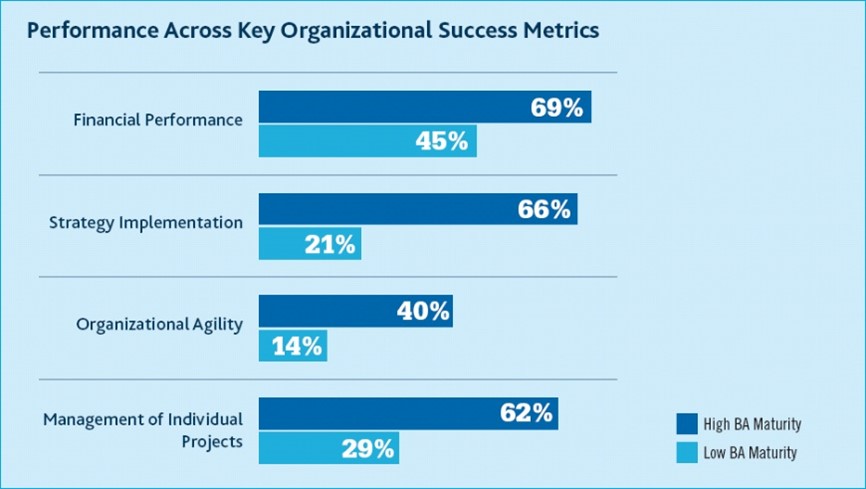Business Analyst Training in 2025 | 100% Success Guarantee
Need | Focus | Modes | Topics | Tools | Certifications | Providers
Need for Business Analyst Training
Poor business analysis is the cause of 39%* of project failures.
Organizations having high BA maturity out-perform in multiple aspects. * According to the PMI Pulse of the Profession® report. Here is an interesting summary of the research carried out by PMI, USA.

Business analysts transform businesses. They make digital transformation easier. They facilitate change. Business analysts wear many hats. They translate complex processes into developer language during system development. They drive change and act as information conduits. "Business analysts enable the organization to choose the right business needs, define stakeholder needs correctly, and enables stakeholders to move to a better state." Investing in business analyst training will provide one of the highest returns on the investment to the organization.
The Focus of Business Analyst Training
As business analysis is a vast domain, organizations need to carefully choose the areas to focus on during the business analyst training. It is possible to train on multiple focus areas, but they are better done when conducted with a single focus. 4 dominant focus areas of business analyst training are:
-
Business needs analysis training
-
Business data analysis training
-
Business process analysis training
-
Business performance analysis training
Business Needs Analysis Training
In business needs analysis training, the focus is on understanding organizational problems (mainly poor process performance issues) and thinking about developing a solution, largely software applications. The training focuses primarily on planning the business needs analysis, eliciting stakeholder requirements for the new solution, and describing them in sufficient detail so that developers can build the software to fulfill the business needs.
Business Data Analysis Training
In business data analysis training, the focus is to understand organizational problems (mainly poor process performance issues), identify underlying causes using data, identify business opportunities, and answer research questions posed by stakeholders. The training primarily focuses on planning the business data analysis, understanding stakeholder information needs, collecting data, and building models to predict process performance. Data analysis can be effectively used to identify fraudulent transactions, predict customer behavior, suggest products that the customer is likely to buy, etc.
Business Process Analysis Training
In business process analysis training, the focus is to understand process problems and issues, identify underlying causes using data, identify process improvement opportunities, implement process improvement suggestions, and monitor process performance. The training primarily focuses on planning the process analysis, collecting data, and building models to understand process performance.
Business Performance Analysis Training
In business performance analysis training, the focus is to define organizational performance metrics, identify performance variances against targets set, trends of organizational performance metrics, and identify areas of improvement.
Types of Business Analyst Training
Skill improvement-oriented business analyst training
Skill improvement training focuses on improving specific skills for business analysts. It may cover aspects like how to conduct effective requirements elicitation, how to model requirements, how to analyze data using excel etc. These training are usually short and have in-class assignments. These types of training are quite popular with corporate customers. Read benefits of skill training.
Certifications Oriented Business Analyst Training
Certification training focuses on improving the knowledge of business analysts. It may cover much broader concepts compared to skill improvement training. Other than covering topics such as how to conduct effective requirements elicitation and how to model requirements, these may cover aspects such as change strategy and solution performance evaluation. These training are usually long and do not have in-class assignments. These types of training are quite popular with practicing business analysts. Read benefits of certifications.
Boot Camps
Intensive adult software training programs, also called boot camps, have become popular in recent years as the software skills gap has widened. Boot camps are rigorous and fast-paced, combining theory, hands-on applications, and support for interview preparation skills (e.g., resume-building, interviewing, etc.). Explore Business Analysis Boot Camp here.
What Business Analyst training covers
Tasks taught during Business Needs Analysis training
- Planning BA approach
- Planning stakeholder engagement
- Planning BA governance
- Planning BA information management
- Identifying BA performance improvements
- Preparing for elicitation
- Conducting elicitation
- Confirming elicitation results
- Communicating BA information
- Managing stakeholder collaboration
- Tracing requirements
- Maintaining requirements
- Prioritizing requirements
- Assessing requirements changes
- Approving requirements
- Analyzing current state
- Defining future state
- Assessing risks
- Defining change strategy
- Specifying and modeling requirements
- Verifying requirements
- Validating requirements
- Defining requirements architecture
- Defining design options
- Analyzing potential value and recommending solutions
- Measuring solution performance
- Analyzing performance measures
- Assessing solution limitations
- Assessing enterprise limitations
- Recommending actions to increase solution value
Tasks taught during Business Data Analysis training
- Defining Business Problem or Opportunity
- Identifying and Understanding the Stakeholders
- Assessing Current State
- Defining Future State
- Formulating Research Questions
- Planning Business Data Analytics Approach
- Selecting Techniques for Identifying the Research Questions
- Planning Data Collection
- Determining the Data Sets
- Collecting Data
- Validating Data
- Selecting Techniques for Sourcing Data
- Developing Data Analysis Plan
- Preparing Data
- Exploring Data
- Performing Data Analysis
- Assessing the Analytics and System Approach Taken
- Selecting Techniques for Analyzing Data
- Identifying and Understanding the Stakeholders
- Planning Stakeholder Communication
- Determining Communication Needs of Stakeholders
- Deriving Insights from Data
- Documenting and Communicating Findings from Completed Analysis
- Selecting Techniques for Interpreting and Reporting Results
- Recommending Action
- Developing Implementation Plan
- Managing Change
- Influencing Business Decision-Making
- Understanding Organizational strategy
- Defining Talent strategy
- Defining Data strategy
- Selecting Techniques for Guiding Company-Level Strategy for Business Analytics
Tasks taught during Business Process Analysis training
- Assessing Current State
- Defining Process Problem
- Defining improvement goals
- Identifying possible factors
- Selecting Techniques for Identifying the factors
- Planning Data Collection
- Collecting Data
- Validating Data
- Developing Data Analysis Plan
- Preparing Data
- Exploring Data
- Performing Data Analysis
- Planning Stakeholder Communication
- Deriving Insights from Data
- Documenting and Communicating Findings from Completed Analysis
- Selecting Techniques for Interpreting and Reporting Results
- Recommending Action
- Developing Implementation Plan
- Implementing Change
- Monitoring post-implementation performance
Tasks taught during Business Performance Analysis training
- Identifying key stakeholders
- Understanding stakeholders' need for KPIs and metrics
- Defining metrics and KPIs
- Planning Stakeholder Communication
- Planning Data Collection
- Collecting Data
- Validating Data
- Developing Data Analysis Plan
- Preparing Data
- Exploring Data
- Performing Data Analysis
- Deriving Insights from Data
- Documenting Findings from Completed Analysis
- Communicating Findings from Completed Analysis
Techniques Covered During the Business Analyst Training
Techniques taught during Business Needs Analysis training
- 5 Why
- Acceptance and evaluation criteria
- Backlog management
- Balanced scorecard
- Benchmarking and market analysis
- Brainstorming
- Business capability analysis
- Business cases
- Business model canvas
- Business rules analysis
- Collaborative games
- Concept modeling
- Data dictionary
- Data flow diagrams
- Data mining
- Data modeling
- Decision analysis
- Decision modeling
- Document analysis
- Estimation
- Financial analysis
- Fishbone diagrams
- Focus groups
- Functional decomposition
- Glossary
- Interface analysis
- Interviews
- Item tracking
- Lessons learned
- Market analysis
- Metrics and key performance indicators (KPIs)
- Mind mapping
- Non-functional requirements analysis
- Observation
- Organizational modeling
- Prioritization
- Process analysis
- Process modeling
- Prototyping
- Reviews
- Risk analysis and management
- Roles and permissions matrix
- Root cause analysis
- Scope modeling
- Sequence diagrams
- Stakeholder list
- Stakeholder map
- State modeling
- Survey or questionnaire
- SWOT analysis
- Use cases and scenarios
- User stories
- Vendor assessment
- Workshops
Techniques taught during Business Data Analysis training
- 5 Why
- Balanced scorecard
- Benchmarking and market analysis
- Brainstorming
- Business cases
- Collaborative games
- Data dictionary
- Data flow diagrams
- Data mining
- Data modeling
- Decision analysis
- Decision modeling
- Document analysis
- Focus groups
- Interviews
- Lessons learned
- Metrics and key performance indicators (KPIs)
- Mind mapping
- Process analysis
- Process modeling
- Risk analysis and management
- Root cause analysis
- Stakeholder list
- Stakeholder map
- Survey or questionnaire
- Vendor assessment
- Workshops
- Regression
- ARIMA method
- Decision Trees
- Random Forrest
- Logistic Regression
- KNN (K-Nearest Neighbors)
- Naïve Bayes
- Support Vector Machine
Techniques taught during Business Process Analysis training
- 5 Why
- Balanced scorecard
- Benchmarking and market analysis
- Brainstorming
- Business capability analysis
- Collaborative games
- Data mining
- Decision analysis
- Decision modeling
- Document analysis
- Fishbone diagrams
- Focus groups
- Interviews
- Item tracking
- Lessons learned
- Metrics and key performance indicators (KPIs)
- Mind mapping
- Observation
- Process analysis
- Process modeling
- Reviews
- Risk analysis and management
- Root cause analysis
- Stakeholder list
- Stakeholder map
- Survey or questionnaire
Techniques taught during Business Performance Analysis training
- Balanced scorecard
- Benchmarking and market analysis
- Brainstorming
- Data mining
- Data modeling
- Decision analysis
- Decision modeling
- Document analysis
- Focus groups
- Interviews
- Lessons learned
- Metrics and key performance indicators (KPIs)
- Mind mapping
- Risk analysis and management
- Ratio analysis
- Stakeholder list
- Stakeholder map
- Survey or questionnaire
Sample Deliverables Produced During the Business Analyst Training
Sample deliverables produced during Business Needs Analysis training
- User stories and acceptance criteria
- UI prototypes
- Process models
- Business requirements document
- System Requirements document
Sample deliverables produced during Business Data Analysis training
- User stories and acceptance criteria
- Research questions
- Data visualizations
- Regression models
- Reports on findings
Sample deliverables produced during Business Process Analysis training
- Current performance metrics
- Process models
- Process analysis findings
- Improvement suggestions
Sample deliverables produced during Business Performance Analysis training
- Current performance metrics
- Performance analysis findings
- Improvement suggestions
Tools Covered During the Business Analyst Training
Tools taught during Business Needs Analysis training
Popular tools covered during the business needs analysis training are:
- Flowcharting and process modeling tools such as MS Visio
- Requirements management tools such as Jira
- Prototyping tools such as Balsamiq
- Documentation tools such as Confluence
- Modeling tools such as StarUML
Tools taught during Business Data Analysis training
Popular tools covered during the business data analysis training are:
- Simple data analysis tools such as MS Excel
- Statistical analysis tools such as Minitab
- Advanced data analysis tools such as R
- Data analysis programming languages such as Python
Tools taught during Business Process Analysis training
Popular tools covered during the business process analysis training are:
- Simple data analysis tools such as MS Excel
- Statistical analysis tools such as Minitab
- Case management tools
Tools taught during Business Performance Analysis training
Popular tools covered during the business performance analysis training are:
- Simple data analysis tools such as MS Excel
- Ratio analysis techniques
Certifications Associated with The Business Analyst Training
Many business analyst training sessions qualify for taking up certification exams later on. Do make sure that the certification body recognizes the training.
Certifications associated with Business Needs Analysis
- IIBA ECBA
- IIBA CCBA
- IIBA CBAP
- BCS BA foundations
- IREB CPRE-FL
Certifications associated with Business Data Analysis
- IIBA CBDA
- Certified Analytics Professional (CAP)
Certifications associated with Business Process Analysis
- Motorola University – Six Sigma Green Belt and Black Belt
- American Society for Quality - Six Sigma Green Belt and Black Belt
- International Association for Six Sigma Certification - Certified Lean Practitioner
Certifications associated with Business Performance Analysis training
- Corporate Finance Institute - Financial Analysis Fundamentals
Business Analyst Training Providers
Reputed business analyst training providers in the world are:
- Harvard Business School
- Wharton Business School
- cPrime
- Adaptive US
For more info visit Adaptive's Business Analysis training.

You May Also Like
These Related Stories

BA Training Providers Guide For 2025

Top 10 BA Challenges and Recommended Solutions



Comments (1)